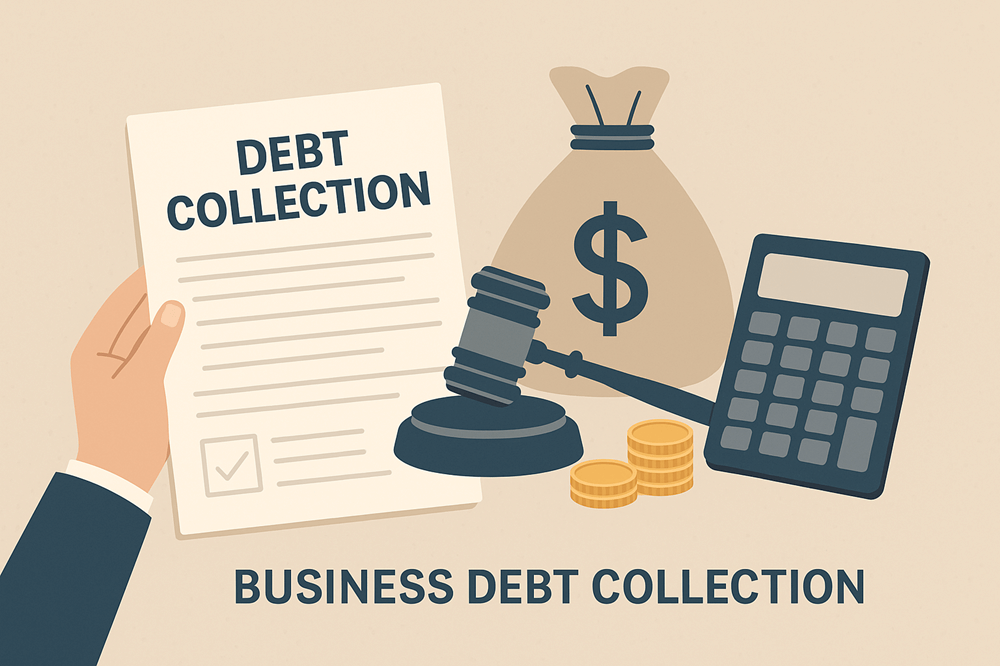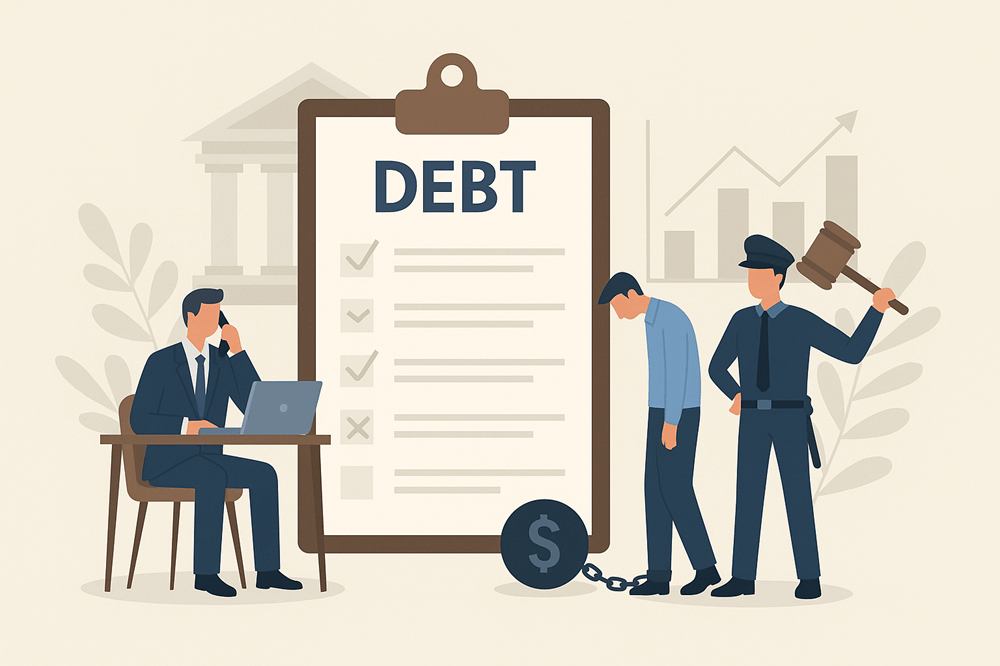Business Debt Collection in Vietnam

In business operations, debt is a common phenomenon, particularly in the context of sales of goods, service provision, or in construction. However, delayed payments or deliberate misuse of funds are among the main factors directly affecting business performance, reputation, and the survival of many companies in Vietnam. Therefore, understanding the legal framework for debt collection is crucial for businesses to protect their rights and minimize risks throughout the debt recovery process.
1. What Is Business Debt Collection in Vietnam?
Vietnamese law does not provide a specific definition of business debt collection. However, it can be understood as the process by which the entitled party (the creditor) takes measures to request the obligated party (the debtor) to fulfill their payment obligations under a contract or an established agreement.
Business debt collection in Vietnam is governed by a number of key legal documents that specifically regulate the rights and obligations of creditors as well as mechanisms to protect their interests in case of disputes. These include:
- Civil Code 2015: Regulates debt repayment obligations, the rights of entitled parties, and liabilities for delayed performance.
- Commercial Law 2005: Governs payment obligations under commercial contracts and liabilities arising from contract breaches.
- Law on Bankruptcy 2014: Provides mechanisms for debt handling in cases where a business is insolvent, protecting the rights of creditors during bankruptcy proceedings.
- Law on Credit Institutions 2024: Regulates lending activities, ensures debt repayment obligations, and establishes mechanisms for handling non-performing loans by credit institutions.
- Civil Procedure Code 2015 and Law on Commercial Arbitration 2010: Prescribe the procedures for filing lawsuits and resolving disputes in courts and arbitration, forming an important legal basis for creditors to initiate a lawsuit to recover debts.
- Other relevant legal documents.
2. Business Debt Collection Process in Vietnam
Typically, the business debt collection process in Vietnam is carried out in three stages as follows:
Stage 1: Negotiation and conciliation for debt recovery
This is the initial step and is usually prioritized due to its speed, the ability to maintain cooperative relations between the parties, and minimal costs. The creditor may send correspondence or a letter of demand to the debtor, citing the relevant contractual provisions and applicable legal regulations.
Stage 2: Filing a lawsuit to competent dispute resolution authority
After carrying out negotiation measures and assessing the feasibility of the case, the business may consider taking more decisive action by filing a lawsuit with a competent court or an arbitration center.
Dispute resolution through arbitration can only be conducted if the parties have an arbitration agreement. This stage is decisive, as the outcome of the court or arbitration proceedings serves as the legal basis for the creditor to request the enforcement authority to compel the debtor to fulfill their payment obligations.
Stage 3: Enforcement of Judgment/Award
After the Judgment/Decision/Arbitral Award of the competent dispute resolution authority takes legal effect, the creditor has the right to request the civil enforcement authority to carry out enforcement. In this stage, the enforcement authority may apply coercive measures such as asset seizure, asset liquidation, or account deduction to ensure the creditor’s legal rights are protected.
3. Where Are Business Debt Collection Disputes Resolved?
According to Article 317 of the Commercial Law 2005, the methods for resolving disputes include: (i) Negotiation between the parties; (ii) Conciliation between the parties by a body, organization or individual selected by the parties to act as the conciliation mediator; and (iii) Resolution by the Arbitration or the Court.
Thus, aside from negotiation, disputes can be resolved at:
- An agency, organization, or individual acting as a mediator when the parties agree to resolve the dispute through mediation, as provided in Article 6 of Decree 22/2017/ND-CP;
- The People’s Court in accordance with the procedures specified in the Civil Procedure Code 2015;
- Arbitration, when the parties have an arbitration agreement, as provided in Article 5 of the Law on Commercial Arbitration 2010.
The legal regulations allow the parties to make flexible choices, from soft measures (negotiation, conciliation) to binding mechanisms (arbitration, court). However, conciliation is a less frequently used method.
4. How Long Does It Take to Recover Business Debt in Vietnam?
The time required to recover debts in Vietnam is not fixed and depends on the chosen recovery method as well as the complexity of the case. According to legal regulations and TNTP’s experience, the estimated duration for each stage is as follows:
- Negotiation and conciliation stage: Typically lasts from 1–3 months. Depending on the goodwill of the parties, debt recovery may be completed within just a few weeks to several months.
- Court proceedings: The statutory time limit for resolving a first-instance business or commercial case is 2 months, which may be extended but not exceeding an additional 2 months. If there is an appeal or protest, the appellate stage is usually conducted within 2–3 months.
- Arbitration proceedings: In general, arbitration proceedings are faster than court litigation, but the costs are higher. The duration of the proceedings depends on the arbitration rules of each arbitral institution. Based on TNTP’s experience, resolving a dispute through arbitration typically takes about 6 months. However, if the debtor files a request to nullify the arbitral award, the case will be reviewed by a competent court, which may further prolong the process.
- Enforcement: Once a court Judgment/Decision/Arbitral Award becomes legally effective, if the debtor does not voluntarily comply, the creditor may request the Civil Judgment Enforcement Authority to apply enforcement measures, such as asset seizure, asset disposal, or deduction of funds from bank accounts. The enforcement process may take from 3 months to several years, depending on the debtor’s financial capacity, the level of cooperation in providing information about assets, and the debtor’s coordination with the civil judgment enforcement authority.
Note: In court or arbitration proceedings, depending on the nature of the case and the available evidence, the duration may be extended beyond the statutory time limit due to certain objective reasons. However, if the debtor cooperates and the parties reach a settlement that is recognized by the Court or the Arbitration, the resolution time will be significantly shortened.
5. Can Creditors Claim Both Principal and Interest on Overdue Debts?
Creditors have the right to request the debtor to pay the principal debt in accordance with Article 280 of the Civil Code 2015, Article 50 of the Commercial Law 2005, and other relevant provisions. Regarding interest in overdue payments, creditors are also entitled to request the debtor to fulfill the payment obligation pursuant to Article 306 of the Commercial Law 2005.
The applicable interest rate shall be based on the agreement of the parties in the contract or other related documents. In the absence of such an agreement, the overdue debt interest rate will be determined according to the average overdue interest rate on the market of at least three (03) commercial banks having their head offices, branches, or transaction offices in the province or centrally-run city where the Court is handling the case.
However, the right to claim interest is only protected within the statute of limitations for initiating legal action. Once the statute of limitations has expired, the creditor is only entitled to claim the principal debt.
According to Article 319 of the Commercial Law 2005, the statute of limitations for initiating lawsuits in commercial disputes is two years from the date the lawful rights and interests were infringed. The limitation period may recommence if the debtor acknowledges the debt or has partially fulfilled the debt obligation
6. Required Documents for Filing a Debt Recovery Lawsuit
To enable the Court or Arbitration to accept and resolve the case, the enterprise must prepare a complete and valid set of filing documents. Depending on the specific circumstances of each case, the required documents may vary; however, a typical set of filing documents usually includes:
- Lawsuit Petition.
- Signed contracts or agreements: proving the existence of contractual obligations between the parties.
- Documents and evidence related to the debt: value-added tax invoices, delivery/acceptance notes for goods or services, debt reconciliation minutes, bank statements, or payment vouchers.
- Documents proving that payment has been requested: demand letters, payment notices, emails, or messages exchanged between the parties.
- Enterprise Registration Certificates of the claimant and the defendant (debtor).
- Other evidence indicates damages or infringed rights and interests (if any).
- Power of Attorney or lawyer appointment documents (if the enterprise authorizes a third party to initiate the lawsuit).
Preparing a complete, accurate, and valid set of filing documents will help expedite the acceptance process, minimizing the risk of the Statement of Claim being returned or requiring supplementation, which could otherwise prolong the resolution process.
7. Our Business Debt Collection Capabilities at TNTP Law Firm
Practical Experience: With over 10 years of legal practice and extensive involvement in handling high-value debt recovery cases (exceeding USD 2.7 million), TNTP has built solid expertise in this challenging area. Recovering difficult debts is never easy; however, with TNTP’s support, clients can significantly enhance their chances of success.
In practice, TNTP has successfully assisted many large domestic and international corporations, including Dekalb Vietnam Co., Ltd. (Monsanto), World Cat Vietnam Sourcing & Development Services Co., Ltd. (Puma), BASF Vietnam Co., Ltd., Sika Limited Vietnam, Yuen Foong Yu Paper Enterprise (Vietnam) Co., Ltd., among others.
Professional Team: TNTP’s lawyers and legal experts are highly trained, with strong skills in case analysis and in developing tailored debt recovery strategies for each specific situation.
Diverse Solutions: We flexibly combine negotiation, mediation, litigation in court, or arbitration to shorten the recovery timeline, reduce costs, and maximize the chances of successful debt collection.
Reputation and Commitment: TNTP is dedicated to safeguarding the lawful rights and interests of our clients. In practice, over 70% of debt recovery cases handled by TNTP have achieved successful outcomes, both at the negotiation stage and during litigation. This figure not only demonstrates our professional competence but also affirms our steadfast commitment to accompanying clients and protecting their interests to the fullest extent.
8. Business Debt Collection Services at TNTP Law Firm
TNTP provides comprehensive debt collection services for businesses across all industries in Vietnam. We represent clients in requesting debtors to make payments or return assets that are due or overdue, in accordance with the relevant agreements and contracts.
In addition, TNTP partners with numerous international debt collection companies such as Sino Credit Management (HK) Ltd, SM Credit Information Co., Ltd, Creditreform (UK) Limited, Upper Class Collections, and Qingdao Seadaka Internet Technology Company Ltd., to support debt recovery in Vietnam.
To ensure transparency and convenience for our clients, TNTP publishes a detailed and publicly available service fee schedule on our website, enabling clients to easily review and select the most suitable service package.
Business debt collection in Vietnam is a complex process that requires a combination of legal knowledge, practical experience, and strategic management. With the continuous improvement of the legal framework, and with TNTP’s support, businesses can proactively safeguard their legitimate rights, enhance debt recovery efficiency, and minimize financial risks in their operations.
The above is TNTP’s article on “Business Debt Collection in Vietnam”, which we are pleased to share with our valued readers. We hope this article will be useful to you.
Best regards,






